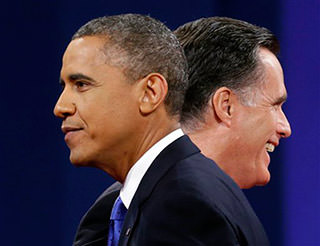Hawks of a Feather Flock Together
The final debate of the presidential campaign was a dismal affirmation by both candidates of a foreign policy that has cost many thousands of lives and injuries and plunged the nation deeply into debt.
The final debate of the presidential campaign was a dismal affirmation by both candidates of a foreign policy that has cost many thousands of lives and injuries and plunged the nation deeply into debt.
It was an odd evening, much different from last week’s encounter. This time Mitt Romney was like the Barack Obama we saw in the first debate, surprisingly passive in the face of the president’s persistent attacks. The Republican nominee was either playing defense to protect his recent gains in public opinion polls or was just having a bad night.
Picking a winner wasn’t important. What mattered most was that Obama and Romney saw things pretty much the same way in this discussion (I wouldn’t call it a debate) on foreign affairs. It was a discouraging evening for all voters — whether on the left or right — hoping for change in the way the country conducts its business overseas.
There are sharp differences between the two on domestic policy — on Social Security, medical care, taxes and preservation of the social and economic safety net.
But it was not these programs that caused the massive national deficit, despite Republican claims to the contrary. Foreign misadventures are to blame. The final debate provided little hope that either Romney or Obama would reverse the pattern.
Middle East policy would remain the same, with unquestioned support for Israel, no American troops sent to Syria or Libya, general support for Egypt and other Arab Spring regimes, slow withdrawal from Afghanistan, more drones and a big defense establishment.
For example, when Romney repeated his charge that the United States Navy is “smaller now than any time since 1917,” Obama zinged him. “I think Governor Romney maybe hasn’t spent enough time looking at how our military works,” the president said. “You mentioned the Navy, for example, and that we have fewer ships than we did in 1916. Well, governor, we also have fewer horses and bayonets — because the nature of our military’s changed. We have these things called aircraft carriers where planes land on them. We have these ships that go underwater, nuclear submarines.”
It was a good line, but nowhere in their discussion was there mention of how military expenditures and the wars in Iraq and Afghanistan have so badly damaged the nation financially.
On Afghanistan, they both supported pulling all American troops out by 2014. “And we’re now in a position where we can transition out, because there’s no reason why Americans should die when Afghans are perfectly capable of defending their own country,” Obama said.
Romney accepted the president’s support of nuclear-armed Pakistan. “I don’t blame the administration for the fact that the relationship with Pakistan is strained,” he said. “We had to go into Pakistan; we had to go in there to get Osama bin Laden. That was the right thing to do. And that upset them, but there was obviously a great deal of anger even before that. But we’re going to have to work with the people in Pakistan to try and help them move to a more responsible course than the one that they’re on.”
Romney also agreed with Obama’s drone campaign. “I believe that we should use any and all means necessary to take out people who pose a threat to us and our friends around the world,” the former governor said. “And it’s widely reported that drones are being used in drone strikes, and I support that entirely and feel the president was right to up the usage of that technology.”
As he did in the first debate, Romney moved to the center, rejecting positions he had taken during the primary campaign to win the support of the Republican right.
He said his plan for the Middle East would be to get Muslim regimes to reject extremism, to promote economic development, have better education and gender equality. None of these goals conflict with anything the Obama administration is pursuing, although Romney said that under the president, the nation has “watched this rising tide of chaos.”
Rather than following up on last week’s failed line of attack on Obama for not immediately blaming terrorists for the killings of four Americans in Benghazi, including the ambassador to Libya, Romney mildly said the United States should not “get involved in a military conflict there,” but should work with the military council in that country. Perhaps Obama’s sharp response to Romney’s terrorist remarks last week persuaded the Republican not to go there again. Whatever the reason, his answer wasn’t enlightening. Nor was the rest of the hour and a half he and Obama spent before the cameras Monday night.
Your support matters…Independent journalism is under threat and overshadowed by heavily funded mainstream media.
You can help level the playing field. Become a member.
Your tax-deductible contribution keeps us digging beneath the headlines to give you thought-provoking, investigative reporting and analysis that unearths what's really happening- without compromise.
Give today to support our courageous, independent journalists.






You need to be a supporter to comment.
There are currently no responses to this article.
Be the first to respond.